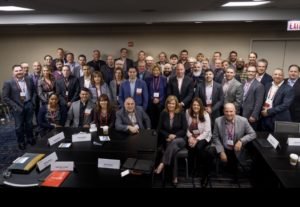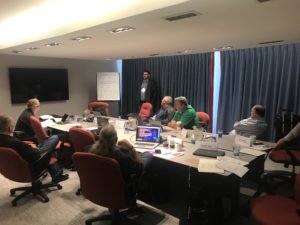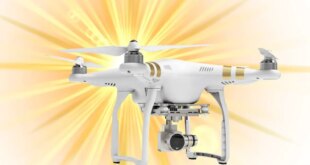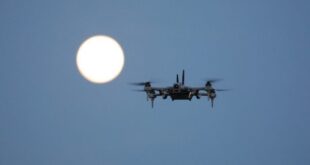CompTIA is a name that many have heard of, even if they aren’t sure what they do. As the world’s largest tech trade association – and the second largest certifying body – CompTIA has been smoothing the way for new technologies to establish training and certification standards for years. Now, CompTIA is moving into the drone space.
 DRONELIFE was honored to have the opportunity of speaking with Annette Taber, Senior Vice President of Industry Outreach for CompTIA. Taber tells DRONELIFE what role CompTIA is taking in the industry – and why – in this in-depth article.
DRONELIFE was honored to have the opportunity of speaking with Annette Taber, Senior Vice President of Industry Outreach for CompTIA. Taber tells DRONELIFE what role CompTIA is taking in the industry – and why – in this in-depth article.
DRONELIFE (DL): Can you tell us a little bit about what you do, how you got started and when you got into drones?
Annette Taber (AT): CompTIA is the world’s preeminent technology trade association, with roots helping solution providers grow their businesses at the beginning of the personal computer revolution. CompTIA is also the 2nd largest, vendor-neutral, certifying body in the world behind Microsoft. We have a policy team on Capitol Hill, a research organization, an education department, and over 100 people solely dedicated to the development of our high stakes Global Certifications. In addition to having four International Communities, we also have Workforce, Emerging Technologies, Cybersecurity, and Managed Services Communities. Finally, I oversee CompTIA’s six Industry Advisory Councils, including Drones, Blockchain, AI, IoT, Business Applications and IT Channels. Our Councils spearhead CompTIA’s acceleration into these new emerging markets. Our mission is to build resources and content that help educate the industry and drive the adoption of emerging technologies, including drones, into business operations—we call it, “The Business of Technology.”
 We launched our first Drone Council three years ago. We recognized that drones and the UAV industry are a growing segment of the market, and an increasingly important component of the tech industry for two reasons. First, drones collect a tremendous amount of data that can be analyzed and utilized within an IT infrastructure to improve business outcomes. Second, the number of commercial use cases and applications for drone technology is nearly limitless. To put it simply, drones are an increasingly important technology that make businesses more productive and efficient. CompTIA wants to assist in driving that demand. We recently launched a Technology Interest Group for Drones, which is open to any and all drone enthusiasts to meet and discuss topics, trends, and regulations related to UAV.
We launched our first Drone Council three years ago. We recognized that drones and the UAV industry are a growing segment of the market, and an increasingly important component of the tech industry for two reasons. First, drones collect a tremendous amount of data that can be analyzed and utilized within an IT infrastructure to improve business outcomes. Second, the number of commercial use cases and applications for drone technology is nearly limitless. To put it simply, drones are an increasingly important technology that make businesses more productive and efficient. CompTIA wants to assist in driving that demand. We recently launched a Technology Interest Group for Drones, which is open to any and all drone enthusiasts to meet and discuss topics, trends, and regulations related to UAV.
DL: How big is CompTIA as a company – and what parts of the world do cover?
AT: CompTIA has over 250 employees worldwide, earns more than $80 million a year in revenue from our Certifications, making us 95% self-funded, an enviable position to be in. We don’t rely on membership dues, which make up less than 4% of our revenue. We have a network of thousands of technology organizations and hundreds of thousands of business professionals, leaders and influencers worldwide. We’re based in the U.S., but we have dedicated IT communities comprised of tech companies and professionals for Canada, the United Kingdom, Benelux (Belgium, The Netherlands and Luxembourg) and ANZ (Australia and New Zealand), as well as many more communities focused on both technologies and business topics. We are looking next at Singapore as it’s our goal to have a community on every continent!
DL: What problem is CompTIA is trying to solve? What does CompTIA do that will bring the industry to the next level?
AT: We are looking to advance drone technologies by expanding and showcasing various business use cases that help drive demand with businesses of all sizes. We’re doing this on a number of fronts. For example, through our virtual Drone Interest Group that I mentioned earlier. Then we have our Drone Advisory Council comprised of industry thought leaders and experts who meet to discuss industry issues, develop content that helps accelerate adoption, participate in speaking engagements that bring more awareness to the market, and advise CompTIA on how best to support the Drone industry. We also produce a research report, “The Drone Market: Insights from Customers and Providers.” Finally, our Drone Advisory Council developed CompTIA Drone Standards and Best Practices, a document that anyone can use as a guide to ensure safe, legal operation of drones.
CompTIA has the financial resources, policy power, training and certification expertise to help streamline the business side of the Drone Industry. Our mission is not to promote the latest drone technologies, rather, to educate and teach DSPs how to expand and grow their practices.
 DL: What services do you bring to the drone marketplace?
DL: What services do you bring to the drone marketplace?
AT: As indicated above, we depend on the innovative manufacturers, drone service providers, training companies, and industry associations to provide guidance and training on drone technology and drone services offerings to the UAV industry. CompTIA instead, brings more of a business focus, more of the discussion and debate surrounding market dynamics, barriers and accelerators to adoption, business trends, use cases, new routes to market, navigation techniques that support the tech buyer’s journey, business standards, technical certifications, education and research. All of these resources tied to driving adoption of UAV technology into mainstream business. I think CompTIA can help bring a sense of discipline to what has been described to us as the wild, wild west of a burgeoning new industry. That includes sharing knowledge and best practices from the more mature IT Industry, a wealth of resources, worldwide reach, and a platform for drone enthusiasts and professionals to network and advance their business cases.
We want to help shine a light on the drone industry. We want to introduce UAV technologies and its numerous use cases, to IT professionals managing the networks of hundreds of thousands of businesses worldwide. We believe strongly in promoting safety and best practices, demonstrating value for businesses, and helping the industry improve its operations and processes. We’re altruistic in everything we do. Bottom line, we want to help support the growth of this industry.
 DL: We know that you bring a lot of experience to certifications levels to a variety of markets. Can you tell us more about that?
DL: We know that you bring a lot of experience to certifications levels to a variety of markets. Can you tell us more about that?
AT: CompTIA has been a trusted certification body for the technology world for almost 40 years, with more than 2.5 million individuals certified in a wide variety of technology and security disciplines. CompTIA’s deep partnerships with industry and governments worldwide ensure a high-quality workforce in technology, including a key partnership with the Department of Defense where CompTIA represents more than 80% of certifications issued in IT security. This requirement to be CompTIA certified extends to all government defense contractors, with companies such as Raytheon, Lockheed Martin, Northrop Grumman and Harris Corporation. CompTIA also participates in several standards setting bodies, including NIST as well as the National Initiative for Cybersecurity Education, helping establish and maintain national information security standards. More than 100 staff are dedicated to CompTIA’s certification and training programs.
We believe many of our cybersecurity certifications cross over to drone business opportunities. Drones collect a lot of sensitive, proprietary data that must be managed in a secure manner. In such cases, it requires the drone service provider to not just have a fundamental understanding of drone-related laws and operational procedures, but cybersecurity and compliance capabilities as well. This holds true in many IT areas and will become increasingly important as drones are integrated more into other technology solutions.
DL: What kind of companies are members? Is the membership one size fits all or are there different levels?
AT: Our members include virtually anyone who buys, sells, influences or is associated with the business of technology. That includes traditional technology vendors, distributors, solution providers, consultants, and integrators, but we’re also seeing many new types of companies become members because technology is so ingrained in business now. That latter group may include financial services companies, accountants, legal firms, digital marketing agencies and more.
We offer two basic forms of membership. Registered users are individuals who join on their own to receive access to all our communities, meetings, webinars, research and resources. Corporate membership offers even greater benefits to everyone at your company, including unlimited access to all our content and resources, certification discounts, a member-to-member directory, the ability to serve in a community leadership position, and much more. We have additional levels for IT pros and students, as well as public sector and advocacy memberships to help shape legislative decision and define solutions for the government. No matter how you’re involved in the tech industry, there’s a membership option right for you.
DL: What do you have down the road in terms of new services that you can share with us?
AT: We will continue to expand and update our Drone Standards and Best Practices, and we’ve also been piloting our Drone Interest Group. This new offering will officially launch in 2020 and will provide a unique virtual platform for Drone Service Providers to talk to each other, ask advice and seek answers and help. Our bi-monthly Drone Interest Group calls will be complimented by an interactive engagement platform later in 2020 and will continue to serve as a launching point for discussion and news, giving our members the networking and resources they need to advance drone technology in the market. You’ll also see us more involved in drone activities and events into 2020. There’s a lot of opportunity, but there’s a lot of work to do to help advance drone technology in the market.
Finally, CompTIA is supporting the Aerospace Industry Association on the development of an industry consensus standard that will focus on cybersecurity of UAS. The Standard will primarily focus on Data Privacy, Ownership, Collection, Distribution, and Storage. This standard development process will be performed in partnership with the federal government to help fill a void in the industry because there are no current standards that cover these topic areas. CompTIA’s Chief Technology Evangelist, Dr. James Stanger has been appointed to this committee to represent CompTIA’s cybersecurity expertise related to the above topics.
DL: How is the drone space going so far? What have you learned that you were not expecting when you got started in the drone marketplace?
AT: We’ve learned how passionate those involved in the drone industry are about the market, especially as it relates to safety and regulatory issues, the importance of abiding by industry protocols, and how much work there is still to be done. Our research shows that appreciation for drone technologies is increasing and that the market is ripe for partnerships, but there are market growth obstacles—including conflicts with hobbyists and unlicensed operators, and it can be difficult to find the talent to fill drone-related jobs. Innovation is outpacing training and the lack of qualified resources can stifle potential growth. That’s why we feel it’s so important for CompTIA to recruit new members and help advocate for more education, training and certifications to help fill that skills gap.
DL: What other things do you wish that we had asked you about that you would like our readers to know about?
AT: Only that CompTIA is completely committed to advancing drone technology and the UAV market. You’ll see us attending and presenting at drone industry events, recruiting new members—including both drone experts as well as new entrants to the market. As I mentioned earlier, the applications and use cases for drones is almost limitless. Unfortunately, there is a belief by some that drone technology is often used for spying and other nefarious purposes. The positive use cases far outweigh the negative, so it’s just a matter of educating the masses so they’re better informed. Drone technologies bring a lot of value to both businesses and consumers. We’re working closely to advocate on behalf of the industry with other organizations and governmental agencies. We want to ensure that the drone industry can continue to be successful by operating in a safe, secure, and legal manner. CompTIA is here for the long term. We have lots of resources, and plan to do big things in the future. To learn more, visit us at www.comptia.org
CEO DroneLife.com, DroneRacingLife.com, and CMO of Jobfordrones.com. Principle at Spalding Barker Strategies. Proud father of two. Enjoys karate, Sherlock Holmes, and interesting things. Subscribe to all things drone at DroneLife here.
https://dronelife.com/2019/12/17/comptia-one-of-the-largest-certifying-organizations-in-the-world-moves-into-drone-space/
 Unmanned Aerial Vehicle The latest drone news
Unmanned Aerial Vehicle The latest drone news





